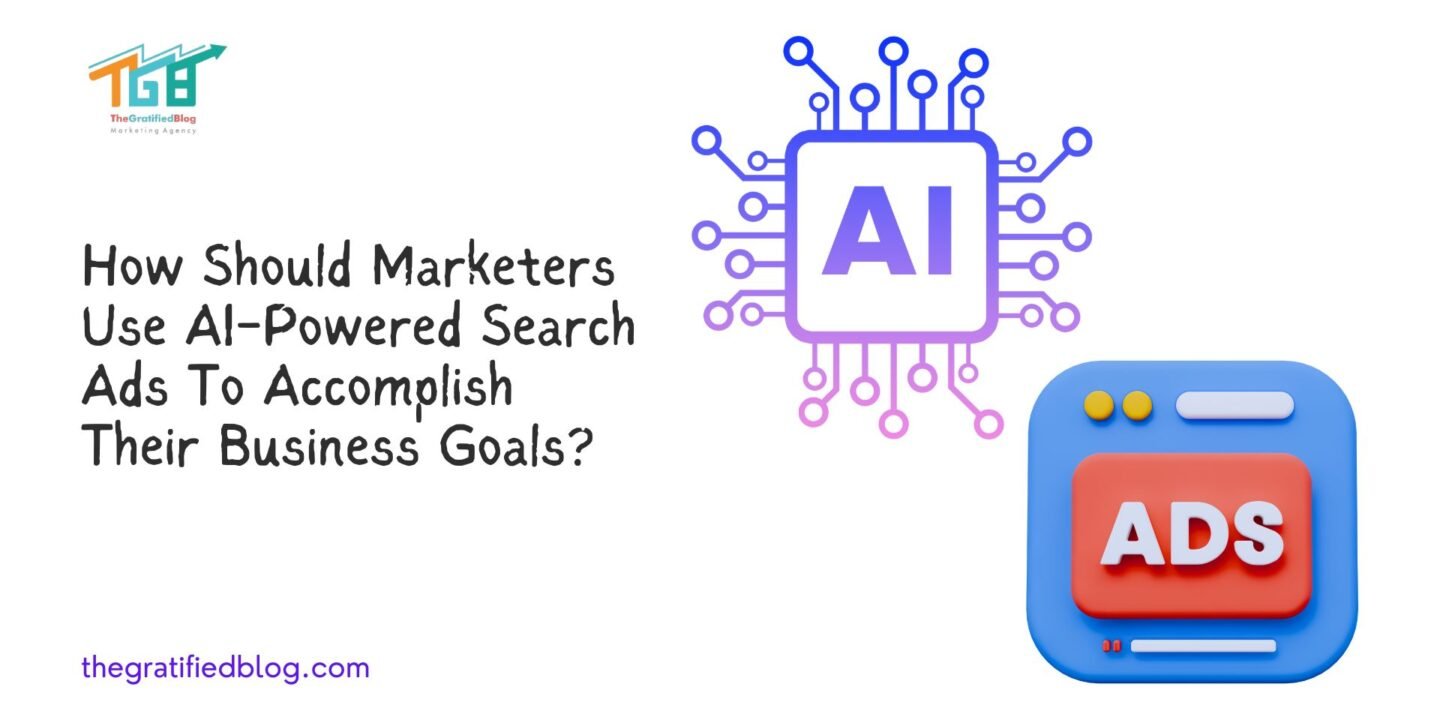
In today’s fast-paced digital landscape, marketers constantly seek innovative ways to optimize their strategies and achieve business goals. One of the most transformative tools at their disposal is artificial intelligence (AI). AI-powered search ads, in particular, have revolutionized how businesses approach digital marketing. This blog, “How should marketers use AI-powered search ads to accomplish their business goals?” will explore how marketers can leverage AI-powered search ads to enhance their campaigns, improve efficiency, and drive better results.
Understanding AI-Powered Search Ads
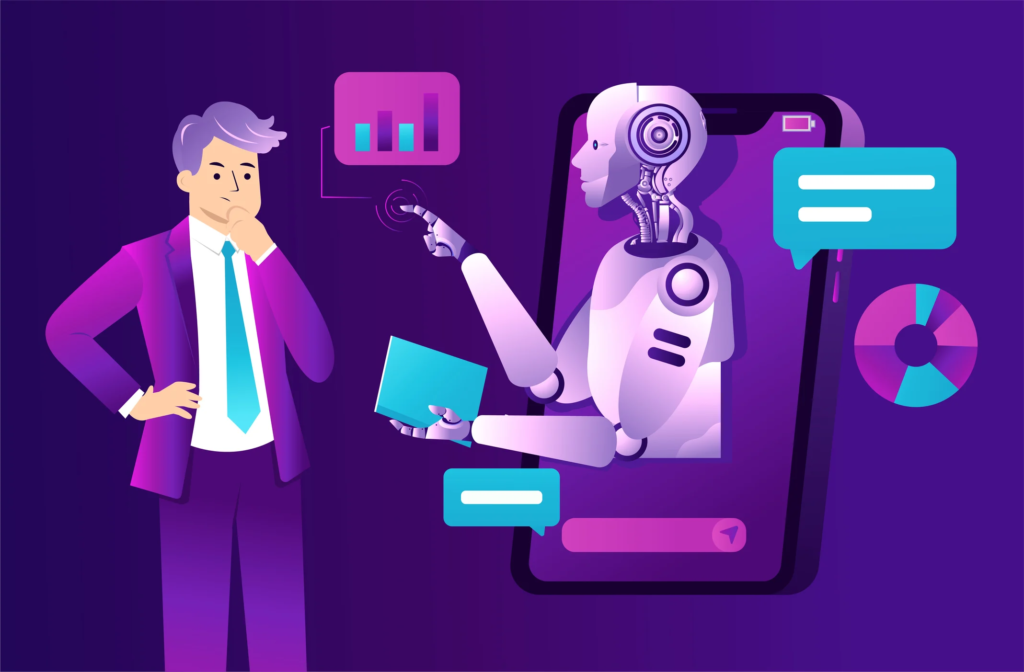
AI-powered search ads utilize machine learning and artificial intelligence to automate and optimize search engine marketing. These ads go beyond traditional pay-per-click (PPC) campaigns by analyzing huge amounts of data, identifying patterns, and making real-time adjustments to improve performance.
AI-powered search ads are designed to:
- Enhance Targeting: By analyzing user behaviour, demographics, and interests, AI can create highly targeted ad campaigns that reach the right audience at the right time.
- Optimize Bidding: AI algorithms can adjust bids in real time, ensuring advertisers get the best return on investment (ROI).
- Personalize Content: AI can tailor ad content to individual users, increasing engagement and conversion rates.
- Improve Efficiency: Automation reduces the time and effort required to manage campaigns, allowing marketers to focus on strategy and creativity.
Benefits Of Using AI-Powered Search Ads In Marketing Strategies
Utilizing AI-powered search ads offers many benefits for marketers striving to achieve their business goals. AI in marketing benefits include:
- Behavioural Targeting: AI enables precise targeting by analyzing user behaviour and preferences, delivering ads to the right audience at the right time.
- Real-Time Optimization: AI optimizes ad relevance through real-time data analysis, ensuring ads resonate with potential customers.
- Optimize Ads: AI-driven algorithms continuously improve ad performance by adjusting keywords, bidding strategies, and placements to maximize marketing ROI.
By using AI technology in their search advertising strategies, marketers can enhance efficiency, boost conversion rates, and ultimately drive business success.
Setting Clear Objectives and KPIs
Before launching AI-powered search ads, it is crucial to define clear objectives and key performance indicators (KPIs). Understanding what you aim to achieve with your campaigns will guide your AI strategy and help measure success.
Start by identifying your primary business goals. These could include:
- Increasing Website Traffic: Driving more traffic to boost website visibility, brand awareness and potential sales.
- Generating Leads: Collecting contact details from prospective customers for follow-up and nurturing.
- Boosting Sales: Directly increasing product or service sales through online advertising.
- Improving ROI: Maximizing the return on your advertising spend.
Once you have defined your business goals, set specific, measurable KPIs to track your progress. Common KPIs for AI-powered search ads include:
- Click-Through Rate (CTR): The percentage of people who click on your ad after seeing it.
- Conversion Rate: The percentage of users who successfully perform a desired action, such as purchasing or filling out a form.
- Cost Per Click (CPC): The average amount you pay for each click on your ad.
- Return on Ad Spend (ROAS): The revenue generated for every dollar spent on advertising.
By setting transparent objectives and KPIs, you can effectively measure the impact of your AI-powered search ad campaigns and make data-driven decisions.
How Should Marketers Use AI-Powered Search Ads To Accomplish Their Business Goals?

Marketers can leverage AI-powered search ads to accomplish their business goals through several strategic approaches:
- Enhanced Targeting and Personalization
- Audience Segmentation: AI enables precise audience segmentation based on demographics, browsing history, and purchase behaviour. This allows marketers to generate highly targeted ad campaigns that are more likely to resonate with specific audience segments.
- Personalized Ad Copy: AI can analyze user data to tailor ad copy that speaks directly to the interests and needs of individual users. This personalization increases customer engagement and conversion rates.
- Dynamic Search Ads: Using AI, dynamic search ads automatically generate ads based on your website’s content. This ensures that the most relevant ads are shown to users searching for related products or services.
- Optimizing Bidding Strategies
- Automated Bidding: AI algorithms can manage and optimize bidding strategies in real time, making sure that your ads are competitive without overspending. Automated bidding adjusts bids based on time of day, user device, and competition levels.
- Predictive Analysis: AI uses historical data and trends to predict future performance and adjust bids accordingly. This helps maximise the return on ad spend (ROAS) by allocating the budget to the highest-performing keywords and ads.
- Improving Ad Performance and ROI
- Performance Monitoring: AI tools can continuously monitor ad performance, providing real-time insights and suggesting adjustments to improve results. This proactive approach ensures that campaigns are always optimized for the best outcomes.
- A/B Testing: AI facilitates A/B testing by quickly analyzing the performance of different ad variations and identifying the best-performing ones. This helps marketers understand what works and apply those insights to future campaigns.
- Conversion Rate Optimization: By analyzing user behaviour and ad performance, AI can identify factors contributing to higher conversion rates and suggest improvements to landing pages and ad content.
- Content Creation and Management
- Ad Creative Generation: AI can assist in generating ad creatives by analyzing what elements (images, headlines, descriptions) have performed well in the past. This speeds up the creative process and ensures high-quality, engaging ads.
- Content Optimization: AI tools can optimize ad content for different platforms and devices, ensuring that ads look great and perform well across all user touchpoints.
- Audience Insights and Data Analysis
- Deep Data Analysis: AI can process vast amounts of data to uncover deep insights about audience behaviour, preferences, and trends. This information is vital for crafting effective marketing strategies.
- Predictive Modeling: AI uses predictive modelling to forecast future trends and user behaviour, allowing marketers to stay ahead of the curve and adjust their strategies proactively.
- Sentiment Analysis: AI-driven sentiment analysis helps marketers realize how their audience feels about their brand and products. This can inform campaign adjustments to better align with audience sentiment.
- Enhancing User Experience
- Chatbots and Virtual Assistants: Integrating AI chatbots with search ads can enhance user experience by providing instant responses to queries, guiding users through the purchase process, and offering personalized recommendations.
- Voice Search Optimization: With the rise of voice search, AI helps optimize ads for voice queries, ensuring they are accurately targeted and relevant to users’ spoken searches.
- Cost Efficiency and Budget Management
- Budget Allocation: AI can optimize budget allocation across different campaigns and platforms, ensuring that funds are spent where they are most likely to generate the best returns.
- Cost-Per-Click (CPC) Management: AI-driven tools can manage and reduce CPC by identifying the most cost-effective keywords and ad placements.
- Scaling Campaigns
- Automated Scaling: AI allows for the seamless scaling of ad campaigns. Once a campaign is proven effective, AI can help expand its reach to more users and new markets without significant manual intervention.
- Multi-Channel Management: AI enables the management of ad campaigns across multiple channels (search, display, social media) from a single platform, ensuring a cohesive strategy and consistent performance.
- Competitor Analysis
- Competitive Benchmarking: AI tools can analyze competitors’ ad strategies, performance, and market positioning. This information helps marketers refine their own strategies to stay competitive.
- Gap Analysis: AI identifies gaps in the market that competitors have not exploited, providing opportunities for marketers to fill these gaps with targeted ad campaigns.
- Ad Fraud Detection and Prevention
- Fraud Detection: AI can detect and prevent ad fraud by analyzing patterns and identifying suspicious activities. This ensures that the ad budget is spent on genuine clicks and impressions.
- Quality Control: AI helps maintain ad quality by monitoring compliance with ad guidelines and preventing the displaying of low-quality or irrelevant ads.
By integrating AI-powered search ads into their marketing strategies, businesses can achieve greater precision in targeting, enhanced personalization, improved performance metrics, and more efficient use of their marketing budgets. This ultimately leads to increased conversions, customer satisfaction, and business growth.
FAQs
Q1. What are AI-powered search ads?
Answer: AI-powered search ads use artificial intelligence to optimize various aspects of search advertising, including targeting, bidding, ad copy generation, and performance analysis. These ads leverage AI algorithms to improve efficiency and effectiveness, resulting in better engagement and higher conversion rates.
Q2. How to use AI in search ads to improve targeting?
Answer: Using AI in marketing enhances targeting by analyzing user data to create detailed audience segments. This data includes demographics, browsing history, and past purchasing behaviour. By understanding these factors, AI can ensure that ads are visible to users who are most likely curious about the advertised products or services.
Q3. What is automated bidding, and how does it work?
Answer: Automated bidding uses AI to manage and adjust bids for search ads in real time. AI algorithms consider factors such as competition, user behaviour, and historical performance to set optimal bids, ensuring ads are competitive without overspending. This helps maximize the return on ad spend (ROAS).
Q4. How do AI-powered search ads optimize performance?
Answer: AI optimizes ad performance by continuously monitoring metrics like click-through rates (CTR), conversion rates, and cost-per-click (CPC). It provides real-time insights and recommendations for adjustments, such as changing keywords, ad copy, or bidding strategies, to improve overall ad effectiveness.
Q5. How does AI assist with A/B testing in search ads?
Answer: AI can rapidly analyze the performance of different ad variations in A/B testing, identifying which versions perform best. This lets marketers make data-driven decisions and implement the most effective ad elements in future campaigns.
Conclusion
AI-powered search ads offer marketers many opportunities to enhance their campaigns and achieve their business goals. By leveraging AI for better targeting, optimizing bidding strategies, creating personalized ad content, and improving campaign performance and efficiency, marketers can stay ahead of the competition and drive significant results.
Incorporating AI into your search ad strategy is no longer a luxury but a necessity in today’s competitive market. The time to start is now—harness the power of AI and watch your marketing efforts soar to new heights.




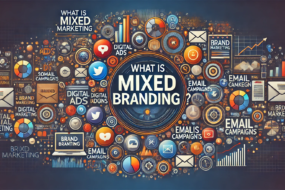
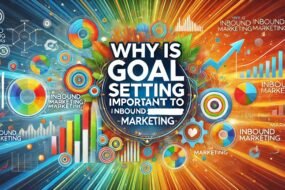
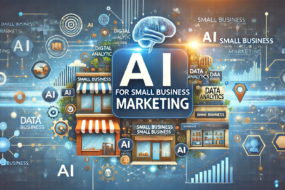

No Comments